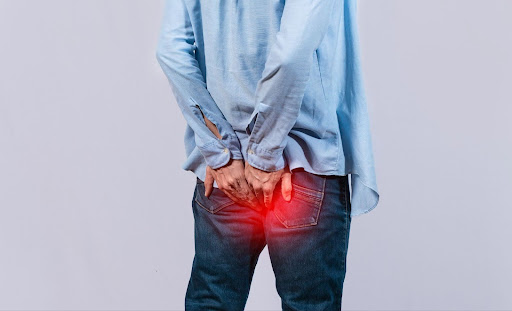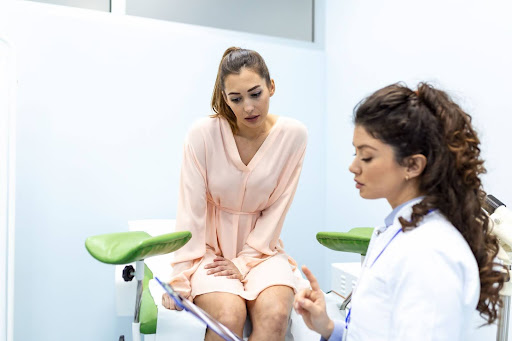Hemorrhoids, also known as piles, are swollen veins in the lower rectum and anus that can cause discomfort, pain, and itching. While many people associate hemorrhoids with bleeding or pain, one of the most distressing symptoms is itching. Understanding why hemorrhoids itch so badly can provide insights into their management and prevention.
Understanding Hemorrhoids
 Before delving into the reasons behind the itching, it is essential to understand hemorrhoids. There are two main types: internal and external. Internal hemorrhoids occur inside the rectum, while external hemorrhoids develop under the skin around the anus.
Before delving into the reasons behind the itching, it is essential to understand hemorrhoids. There are two main types: internal and external. Internal hemorrhoids occur inside the rectum, while external hemorrhoids develop under the skin around the anus.
Internal hemorrhoids are typically painless but may bleed during bowel movements, while external hemorrhoids can be painful and may cause discomfort, especially when sitting or during physical activities.
Hemorrhoids are a common condition that affects millions of people worldwide, yet many individuals feel embarrassed to discuss their symptoms. This stigma can lead to a lack of awareness about the condition and its treatment options.
Understanding the nature of hemorrhoids is crucial, as it can empower individuals to seek help and adopt preventive measures. Lifestyle changes, such as increasing fiber intake and staying hydrated, can significantly reduce the risk of developing hemorrhoids.
Causes of Hemorrhoids
Several factors contribute to the development of hemorrhoids, including:
Straining during bowel movements: This is often caused by constipation or diarrhea.
Pregnancy: Increased pressure on the pelvic blood vessels can lead to hemorrhoids.
Obesity: Excess weight can add pressure to the veins in the rectum.
Aging: As skin loses elasticity, veins can become more prone to swelling.
In addition to these common causes, prolonged sitting or standing can also contribute to the development of hemorrhoids. Occupations that require long hours of sitting, such as desk jobs or truck driving, can increase the risk.
Furthermore, a sedentary lifestyle characterized by minimal physical activity can exacerbate the problem. Regular exercise not only helps maintain a healthy weight but also promotes regular bowel function, reducing the likelihood of straining during bowel movements.
Additionally, certain medical conditions, such as liver disease or chronic cough, can increase pressure in the abdominal area, further contributing to the formation of hemorrhoids.
Why Do Hemorrhoids Itch?
The itching associated with hemorrhoids can be attributed to several factors, all of which can create discomfort and lead to a cycle of irritation.
Inflammation and Irritation
When hemorrhoids become inflamed, they can irritate the surrounding skin. This irritation often leads to an intense itching sensation. The inflammation can be exacerbated by:
Hygiene practices: Inadequate cleaning after bowel movements can lead to irritation, while excessive cleaning can strip the skin of its natural oils, causing further discomfort.
Moisture: Excess moisture from sweat or secretions can also contribute to itching.
Skin Conditions
In some cases, skin conditions can complicate hemorrhoids. Conditions such as eczema or psoriasis can coexist with hemorrhoids, leading to additional itching. The inflammation from hemorrhoids can trigger flare-ups of these skin conditions, creating a cycle of discomfort.
Moreover, the skin around the anal area is particularly sensitive, making it more susceptible to irritation from various sources. Certain fabrics, such as rough or synthetic materials, can exacerbate the itching sensation.
Wearing breathable, cotton underwear can help mitigate this issue, allowing for better air circulation and reducing moisture buildup. Additionally, dietary factors can play a role; a diet low in fiber may lead to constipation, resulting in straining during bowel movements, which can worsen hemorrhoid symptoms, including itching.
Another aspect to consider is the psychological impact of dealing with hemorrhoids. The discomfort and embarrassment associated with this condition can lead to increased stress and anxiety, which may, in turn, heighten the perception of itching. Individuals may find themselves in a cycle where the more they focus on the itching, the more pronounced it becomes.
Understanding the underlying causes and addressing them holistically through lifestyle changes, dietary adjustments, and appropriate medical treatments can significantly improve the situation and provide relief from the relentless itching.
Managing Itching from Hemorrhoids
Addressing the itching associated with hemorrhoids involves understanding why do hemorrhoids itch, along with making lifestyle changes, using home remedies, and, in some cases, seeking medical treatment.
Lifestyle Changes
Making specific lifestyle adjustments can significantly reduce the itching and discomfort associated with hemorrhoids:
Dietary modifications: Increasing fiber intake can help prevent constipation and reduce straining during bowel movements.
Hydration: Drinking plenty of water can soften stool and ease bowel movements.
Regular exercise: Physical activity can improve circulation and reduce the risk of developing hemorrhoids.
Home Remedies
Several home remedies can help soothe itching and irritation:
Warm baths: Soaking in warm water can provide relief and reduce inflammation.
Cold compresses: Applying a cold pack can numb the area and reduce swelling.
Over-the-counter creams: Hydrocortisone creams may help alleviate itching and inflammation.
In addition to these remedies, incorporating natural ingredients such as witch hazel or aloe vera can also be beneficial. Witch hazel, known for its astringent properties, can help shrink swollen tissues and relieve itching.
Applying aloe vera gel directly to the affected area can provide a soothing effect due to its anti-inflammatory properties, promoting healing and comfort. Both of these remedies are gentle on the skin and can be used alongside other treatments for improved relief.
Furthermore, maintaining proper hygiene is crucial in managing hemorrhoid symptoms. Gently cleansing the anal area with mild soap and water after bowel movements can prevent irritation.
Avoiding harsh wipes or excessive scrubbing is essential, as these can exacerbate itching and discomfort. Instead, consider using moistened toilet paper or wipes that are free from alcohol and fragrances, as they are less likely to irritate sensitive skin.
When to Seek Medical Attention
 While many cases of hemorrhoids can be managed at home, certain symptoms warrant medical attention. These include:
While many cases of hemorrhoids can be managed at home, certain symptoms warrant medical attention. These include:
Severe pain: If the pain is unbearable, it is essential to consult a healthcare professional.
Persistent bleeding: Blood in the stool or on toilet paper should not be ignored.
Changes in bowel habits: If there are significant changes, such as diarrhea or constipation, it’s advisable to seek help.
Medical Treatments
For those who do not respond to home treatments, medical options are available:
Minimally invasive procedures: Techniques such as rubber band ligation can be effective for internal hemorrhoids.
Surgical options: In severe cases, surgical removal of hemorrhoids may be necessary.
In addition to these treatments, healthcare providers may also recommend lifestyle changes to support recovery and prevent future occurrences. Incorporating a high-fiber diet, staying hydrated, and engaging in regular physical activity can significantly improve bowel health.
Fiber supplements, such as psyllium husk, may also be suggested to ease stool passage and reduce strain during bowel movements, which is crucial for those suffering from hemorrhoids.
Furthermore, understanding the underlying causes of hemorrhoids can be beneficial. Factors such as prolonged sitting, heavy lifting, and straining during bowel movements can contribute to the development of hemorrhoids.
By addressing these lifestyle factors, patients can not only alleviate current symptoms but also reduce the risk of recurrence. Education about proper bathroom habits, such as not delaying the urge to go and avoiding excessive time spent on the toilet, can also play a vital role in managing this common condition.
Preventing Hemorrhoids and Associated Itching
Preventing the development of hemorrhoids is crucial in avoiding the associated itching. Here are some effective prevention strategies:
Dietary Considerations
A high-fiber diet is one of the most effective ways to prevent hemorrhoids. Foods rich in fiber include:
Fruits (e.g., apples, pears, berries)
Vegetables (e.g., broccoli, carrots, leafy greens)
Whole grains (e.g., oats, brown rice, whole wheat bread)
In addition to these fiber-rich foods, staying well-hydrated is equally important. Drinking plenty of water throughout the day helps to soften stool and promote regular bowel movements.
Aim for at least eight glasses of water daily, and consider incorporating hydrating foods like cucumbers and watermelon into your diet.
Furthermore, probiotics found in yogurt and fermented foods can also aid digestion and help maintain a healthy gut flora, which is beneficial for preventing constipation and, consequently, hemorrhoids.
Healthy Bowel Habits
Establishing healthy bowel habits can significantly reduce the risk of hemorrhoids:
Regular bathroom breaks: Avoid delaying bowel movements when the urge arises.
Avoiding straining: If constipation occurs, consider using stool softeners or laxatives, but consult a doctor first.
Additionally, it's essential to practice good posture while using the toilet. Sitting with your feet elevated on a small stool can help align the rectum, making bowel movements easier and less straining.
This technique, often referred to as the "squatty potty" method, can facilitate smoother stool passage. Moreover, try to limit the time spent on the toilet; prolonged sitting can increase pressure on the rectal veins, leading to discomfort and potential hemorrhoid development.
Establishing a routine that includes a consistent time for bowel movements can also help train your body to go more regularly, reducing the likelihood of constipation and straining.
Itch Relief, the Doctronic Way
Hemorrhoid itching is common but beatable. As this article shows, small daily habits like more fiber, water, and gentle cleansing go a long way. When the itch flares up, Doctronic, your AI doctor, can suggest fast home fixes and tell you when it’s time to see a real-life pro.



 Before delving into the reasons behind the itching, it is essential to understand hemorrhoids. There are two main types: internal and external. Internal hemorrhoids occur inside the
Before delving into the reasons behind the itching, it is essential to understand hemorrhoids. There are two main types: internal and external. Internal hemorrhoids occur inside the  While many cases of hemorrhoids can be managed at home, certain symptoms warrant medical attention. These include:
While many cases of hemorrhoids can be managed at home, certain symptoms warrant medical attention. These include: